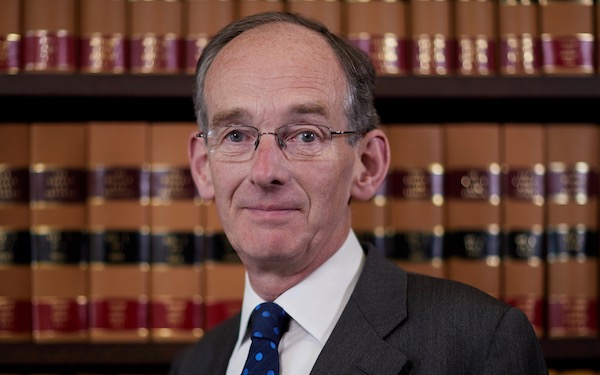
There are positive signs regarding the family justice system’s drive to cut the number and length of care proceedings, its head has said.
The number of public law cases – most of which are council applications for care orders – have fallen year on year and there are indications further progress is being made, said president of the family division of the High Court Sir Andrew McFarlane, in a note to colleagues issued last week.
His comments come two years after an inquiry he commissioned, by the so-called Public Law Working Group (PLWG), recommended far-reaching reforms to tackle “overwhelming demands” on professionals involved in care proceedings.
By the end of the same year, 2021, care applications were taking an average of 46.1 weeks to conclude and just 24% were completed within the legal target of 26 weeks, on the back of high numbers of applications and the impact of Covid-19 on the throughput of family court cases.
The PLWG, made up of practitioners from across the family justice system, called for better and earlier use of pre-proceedings to avoid resort to the courts, a reversal in the decline of the use of section 20 of the Children Act 1989 to accommodate children without a care order, and action to improve the efficiency of proceedings.
PLO relaunch
This was followed by a “relaunch” of the Public Law Outline – which sets out how cases should be handled – in January this year.
A key plank of the revamped PLO was that council social workers and other practitioners follow the PLWG’s best practice guidance on pre-proceedings, issued alongside its main report in 2021.
This stipulates that care proceedings should be a last resort and only initiated “where the safety and welfare of the child demands it and the legal threshold” – that the child is suffering, or likely to suffer, significant harm because of parental care or being beyond parental control – is met.
Pre-proceedings are “a genuine opportunity to work closely with families by offering help and support to address their recognised needs in a bid to negate the need to issue care proceedings”, it states.
Get up to speed on the PLO relaunch

Legal trainer Shefali Shah
Find out what the PLO relaunch means for you and how you can make effective use of pre-proceedings, at this year’s Community Care Live.
Legal trainer Shefali Shah will be delivering a seminar in which she will provide guidance on when to enter pre-proceedings, and how they can be used both to avoid court and to inform subsequent proceedings, when these are necessary.
The session takes place on day two (11 October) of the annual event, at London’s Business Design Centre. Register now for your free place and then take advantage of our early bird discount for legal learning sessions – such as Shefali’s – which is available until 18 August.
In addition, the PLO relaunch includes measures to minimise the number of case hearings and fresh assessments carried out once proceedings have started, to help ensure they are completed within 26 weeks where this can be done justly.
Case numbers coming down
Though figures on the duration of care proceedings have not been published for the period since January 2022, there is evidence of reduced case numbers.
As cited by Sir Andrew in his note, the number of public law cases starting in January to March 2023 was down by 7.4% on the same period in 2022.
Also, Cafcass has recorded a 9.8% drop in the number of public law cases, and a 15% reduction in care application numbers, in April and May 2023, compared with the same months in 2022.
“I have heard of quite significant reductions in new cases being issued in some areas,” said Sir Andrew. “The hope is that this represents a sustained change for sound reasons, and not simply a temporary bottle neck.”
He added: “My expectation is that, once the heavy lifting has started to have an impact, with case volume and case length both reducing, it should become exponentially easier to address more and more cases in a timely manner. The next six months will demonstrate if we are, as the early signs suggest, indeed seeing a positive change.”
President backs supervision order reforms

Photo: Florian/Fotolia
Sir Andrew also reiterated his support for proposed reforms to supervision orders, issued last year by a PLWG sub-group.
Under these, local authorities are expected to present a fully resourced supervision plan – similar to a care plan – in their final evidence to court, and to keep this under review.
Sir Andrew added: “I have endorsed these recommendations and it is to be expected that judges, magistrates and all involved in public law work should begin to apply them in appropriate cases. For too long the option of a supervision order has been seen as either ineffective or otherwise not a viable option for a child.”
He said that it “should be seen as a much more useful option than has been the case in recent years”.



 Family help: one local authority’s experience of the model
Family help: one local authority’s experience of the model  ‘I spent the first three months listening’: how supportive leadership can transform children’s services
‘I spent the first three months listening’: how supportive leadership can transform children’s services  How senior leaders in one authority maintain a culture of excellence
How senior leaders in one authority maintain a culture of excellence  How staff support ensures fantastic outcomes for children and families
How staff support ensures fantastic outcomes for children and families  Workforce Insights – showcasing a selection of the sector’s top recruiters
Workforce Insights – showcasing a selection of the sector’s top recruiters 

 Facebook
Facebook X
X LinkedIn
LinkedIn Instagram
Instagram
Than explain why in 2023 alone 82k of children ended up in care?
So this is wrong it not decreased if anything it increases
In 2022, the number of CLA by local authorities in England rose to 82,170, up 2% on last year, continuing the rise seen in recent years. This is a rate of 70 CLA per 10,000 children.
Or maybe the reduction in care proceedings applications is because there are no foster placements available, which is preventing some applications where there is no care plan?